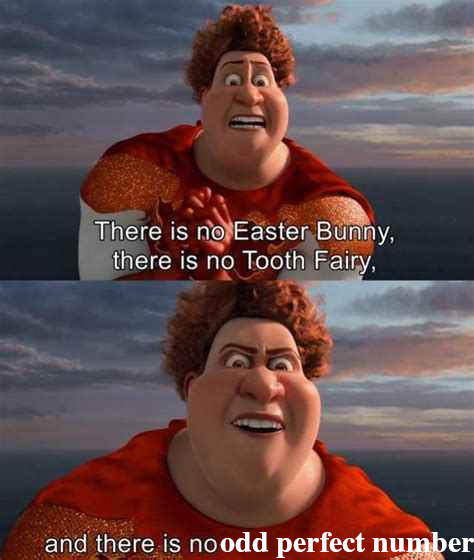5
So you're saying there is one? Because the line that's replaced here is Tighten saying "There's no Queen of England" with the point of the scene being showing he's dumb for thinking something that does exist is like the other mythological things listed
there's no Queen of England though, Titan was just ahead of his time.
There hasn't been a Queen of England since the Acts of Union when the title was replaced with Queen of Great Britain.
I’ve only seen the memes.
I thought that character was a she.
Huh.
This is a good opportunity to go watch megamind
You should watch the movie. It's all kinds of fun.

31521281 = 11 × 17 × 59 × 2857
11 × 17 = 187
11 × 59 = 649
11 × 2857 = 31427
17 × 59 = 10003
17 × 2857 = 48569
59 × 2857 = 168563
17 × 59 × 2857 = 2865571
11 × 59 × 2857 = 1854193
11 × 17 × 2857 = 534259
11 × 17 × 59 = 11033
11+17+59+2857+11033+534259+1854193+2865571+168563+ 48569+10003+31427+649+187=5527398≠31521281
17 × 59 = 10003
you've got an extra zero in there, and you forgot the 1, but the rest of your divisors match my crude brute-force approach:
>>> n=31521281
>>> d = [ x for x in range(1,n//2+1) if not n%x ]
>>> d
[1, 11, 17, 59, 187, 649, 1003, 2857, 11033, 31427, 48569, 168563, 534259, 1854193, 2865571]
>>> yours=list(map(int,"11+17+59+2857+11033+534259+1854193+2865571+168563+48569+10003+31427+649+187".split("+")))
>>> set(yours) - set(d)
{10003}
>>> set(d) - set(yours)
{1, 1003}
>>> sum(d)
5518399
same conclusion though: 5518399 also ≠ 31521281
bonus nonsense
>>> isperfect = lambda n: n == sum(x for x in range(1,n//2+1) if not n%x)
>>> [n for n in range(1, 10000) if isperfect(n)]
[6, 28, 496, 8128]
(from https://oeis.org/A000396 i see the next perfect number after 8128 is 33550336 which is too big for me to wait for the naive approach above to test...) spoiler more bonus nonsense
>>> divisors_if_perfect = lambda n: n == sum(d:=[x for x in range(1,n//2+1) if not n%x]) and d
>>> print("\n".join(f"{n:>5} == sum{tuple(d)}" for n in range(10000) if (d:=divisors_if_perfect(n))))
6 == sum(1, 2, 3)
28 == sum(1, 2, 4, 7, 14)
496 == sum(1, 2, 4, 8, 16, 31, 62, 124, 248)
8128 == sum(1, 2, 4, 8, 16, 32, 64, 127, 254, 508, 1016, 2032, 4064)
:::
In number theory, a perfect number is a positive integer that is equal to the sum of its positive proper divisors, that is, divisors excluding the number itself. For instance, 6 has proper divisors 1, 2 and 3, and 1 + 2 + 3 = 6, so 6 is a perfect number. The next perfect number is 28, since 1 + 2 + 4 + 7 + 14 = 28.
There is noodd.
Send nooddz
33550336 is pretty odd. look at those pairs. they must be fuckin.
Amicable with benefits
13
🖐️
🎤
69: "am I a joke to you?"
It's ok 69. You're perfect just the way you are <3
69 is a Nice number.
Numerology is so weird
Perfect numbers are number theory not numerology
I mean kinda? We're assigning importance to a neat coincidence.
On the one hand, sure.
On the other hand, a lot of significant things in math and science came about because someone noticed and then studied a neat coincidence.
Prove it, i'll wait ^^
I have a proof, but this comment box is too small to contain it.
While you're at it, solve the "all perfect numbers end with a 6 or 8" conjecture.
196
Be sure to follow the rule before you head out.
Rule: You must post before you leave.
